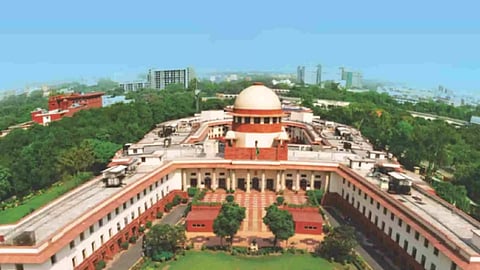

NEW DELHI: The Supreme Court on Monday agreed to examine the Madras High Court order which held that downloading and possessing child pornography is not an offence.
A bench led by Chief Justice of India DY Chandrachud issued notice on the plea.
Chief Justice of India Chandrachud remarked that how can this order be passed as there is a clear provision for this under the act.
The plea was filed by the NGOs Just Rights for Children Alliance and Bachpan Bachao Andolan. The NGOs were represented by Senior Advocate HS Phoolka.
The plea has challenged a Madras High Court order of January 11, this year by the High Court of Madras, which quashed the FIR and criminal proceedings related to the downloading of child pornography and held that downloading and possessing child pornography does not amount to any offense under Section 67B of the Information Technology (IT) Act, 2000.
"The impugned order, extensively covered in newspapers, gives the impression that individuals who download and possess child pornography will not face prosecution. This will encourage child pornography and would act against the well-being of children. The impression is given to the general public that downloading and possessing child pornography is not an offence and it would increase the demand for child pornography and encourage people to involve innocent children in pornography," the petition said.
Chennai Police have registered a case against the accused under Sections 67 B of the IT Act and 14(1) of the POCSO Act after they seized the phone of the accused and discovered that he had downloaded and possessed child pornography.
NGOs further said that the Madras High Court erred in its reliance on the judgment of the High Court of Kerala, stating that the act of watching an obscene photo or video alone does not constitute an offence under Section 292 of the Indian Penal Code (IPC).
"It is relevant to mention that the present case involves the downloading and viewing of pornographic material relating to children, which falls within the ambit of an offence under Section 15 of the POCSO Act, 2012. The distinction is paramount, as the nature of the content and the involvement of minors in the material make it subject to the provisions of the POCSO Act, rendering it a distinct offence from the one considered in the Kerala High Court's judgment," read the plea.
According to the petition, in India, both the POCSO Act 2012 and the IT Act 2000, along with other laws, criminalize the creation, distribution, and possession of child pornography.
"It's imperative to underscore that the legal framework prioritizes the protection of children from sexual exploitation, and any involvement with explicit material involving minors is treated as a grave offence. Under various legal provisions, including the POCSO Act and the IT Act, the possession, distribution, and consumption of child pornography are considered serious crimes. It is important to note that possessing (including simple possession) is illegal (de jure) for child pornography," the petition said.